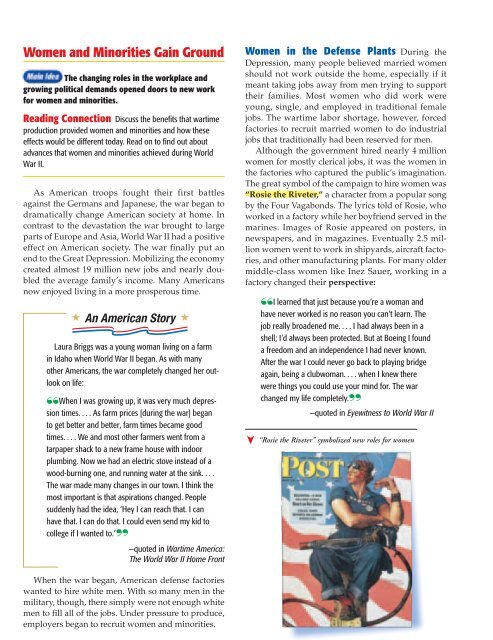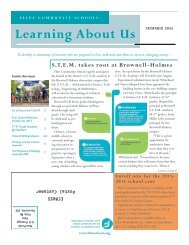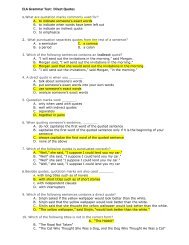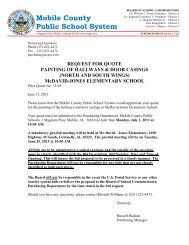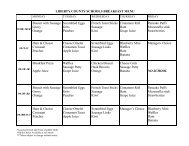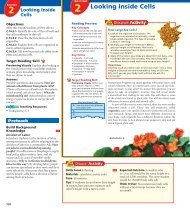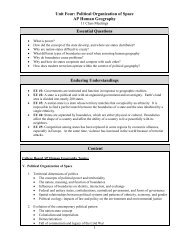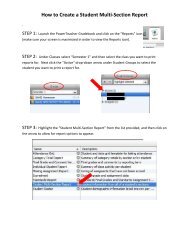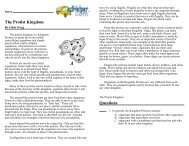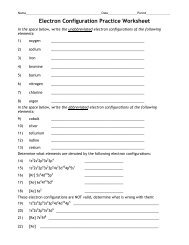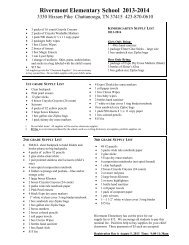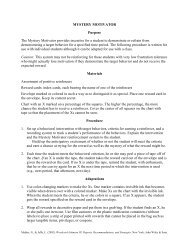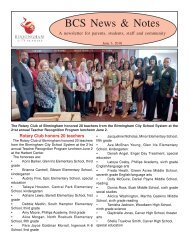Chapter 12: America and World War II, 1941-1945 - Georgia ...
Chapter 12: America and World War II, 1941-1945 - Georgia ...
Chapter 12: America and World War II, 1941-1945 - Georgia ...
Create successful ePaper yourself
Turn your PDF publications into a flip-book with our unique Google optimized e-Paper software.
Women <strong>and</strong> Minorities Gain Ground<br />
The changing roles in the workplace <strong>and</strong><br />
growing political dem<strong>and</strong>s opened doors to new work<br />
for women <strong>and</strong> minorities.<br />
Reading Connection Discuss the benefits that wartime<br />
production provided women <strong>and</strong> minorities <strong>and</strong> how these<br />
effects would be different today. Read on to find out about<br />
advances that women <strong>and</strong> minorities achieved during <strong>World</strong><br />
<strong>War</strong> <strong>II</strong>.<br />
As <strong>America</strong>n troops fought their first battles<br />
against the Germans <strong>and</strong> Japanese, the war began to<br />
dramatically change <strong>America</strong>n society at home. In<br />
contrast to the devastation the war brought to large<br />
parts of Europe <strong>and</strong> Asia, <strong>World</strong> <strong>War</strong> <strong>II</strong> had a positive<br />
effect on <strong>America</strong>n society. The war finally put an<br />
end to the Great Depression. Mobilizing the economy<br />
created almost 19 million new jobs <strong>and</strong> nearly doubled<br />
the average family’s income. Many <strong>America</strong>ns<br />
now enjoyed living in a more prosperous time.<br />
Laura Briggs was a young woman living on a farm<br />
in Idaho when <strong>World</strong> <strong>War</strong> <strong>II</strong> began. As with many<br />
other <strong>America</strong>ns, the war completely changed her outlook<br />
on life:<br />
When I was growing up, it was very much depression<br />
times. . . . As farm prices [during the war] began<br />
“<br />
to get better <strong>and</strong> better, farm times became good<br />
times. . . . We <strong>and</strong> most other farmers went from a<br />
tarpaper shack to a new frame house with indoor<br />
plumbing. Now we had an electric stove instead of a<br />
wood-burning one, <strong>and</strong> running water at the sink. . . .<br />
The war made many changes in our town. I think the<br />
most important is that aspirations changed. People<br />
suddenly had the idea, ‘Hey I can reach that. I can<br />
have that. I can do that. I could even send my kid to<br />
college if I wanted to.’<br />
”<br />
—quoted in <strong>War</strong>time <strong>America</strong>:<br />
The <strong>World</strong> <strong>War</strong> <strong>II</strong> Home Front<br />
Women in the Defense Plants During the<br />
Depression, many people believed married women<br />
should not work outside the home, especially if it<br />
meant taking jobs away from men trying to support<br />
their families. Most women who did work were<br />
young, single, <strong>and</strong> employed in traditional female<br />
jobs. The wartime labor shortage, however, forced<br />
factories to recruit married women to do industrial<br />
jobs that traditionally had been reserved for men.<br />
Although the government hired nearly 4 million<br />
women for mostly clerical jobs, it was the women in<br />
the factories who captured the public’s imagination.<br />
The great symbol of the campaign to hire women was<br />
“Rosie the Riveter,” a character from a popular song<br />
by the Four Vagabonds. The lyrics told of Rosie, who<br />
worked in a factory while her boyfriend served in the<br />
marines. Images of Rosie appeared on posters, in<br />
newspapers, <strong>and</strong> in magazines. Eventually 2.5 million<br />
women went to work in shipyards, aircraft factories,<br />
<strong>and</strong> other manufacturing plants. For many older<br />
middle-class women like Inez Sauer, working in a<br />
factory changed their perspective:<br />
➤<br />
I learned that just because you’re a woman <strong>and</strong><br />
“<br />
have never worked is no reason you can’t learn. The<br />
job really broadened me. . . . I had always been in a<br />
shell; I’d always been protected. But at Boeing I found<br />
a freedom <strong>and</strong> an independence I had never known.<br />
After the war I could never go back to playing bridge<br />
again, being a clubwoman. . . . when I knew there<br />
were things you could use your mind for. The war<br />
changed my life completely.<br />
”<br />
—quoted in Eyewitness to <strong>World</strong> <strong>War</strong> <strong>II</strong><br />
“Rosie the Riveter” symbolized new roles for women<br />
When the war began, <strong>America</strong>n defense factories<br />
wanted to hire white men. With so many men in the<br />
military, though, there simply were not enough white<br />
men to fill all of the jobs. Under pressure to produce,<br />
employers began to recruit women <strong>and</strong> minorities.<br />
CHAPTER <strong>12</strong> <strong>America</strong> <strong>and</strong> <strong>World</strong> <strong>War</strong> <strong>II</strong> 587


